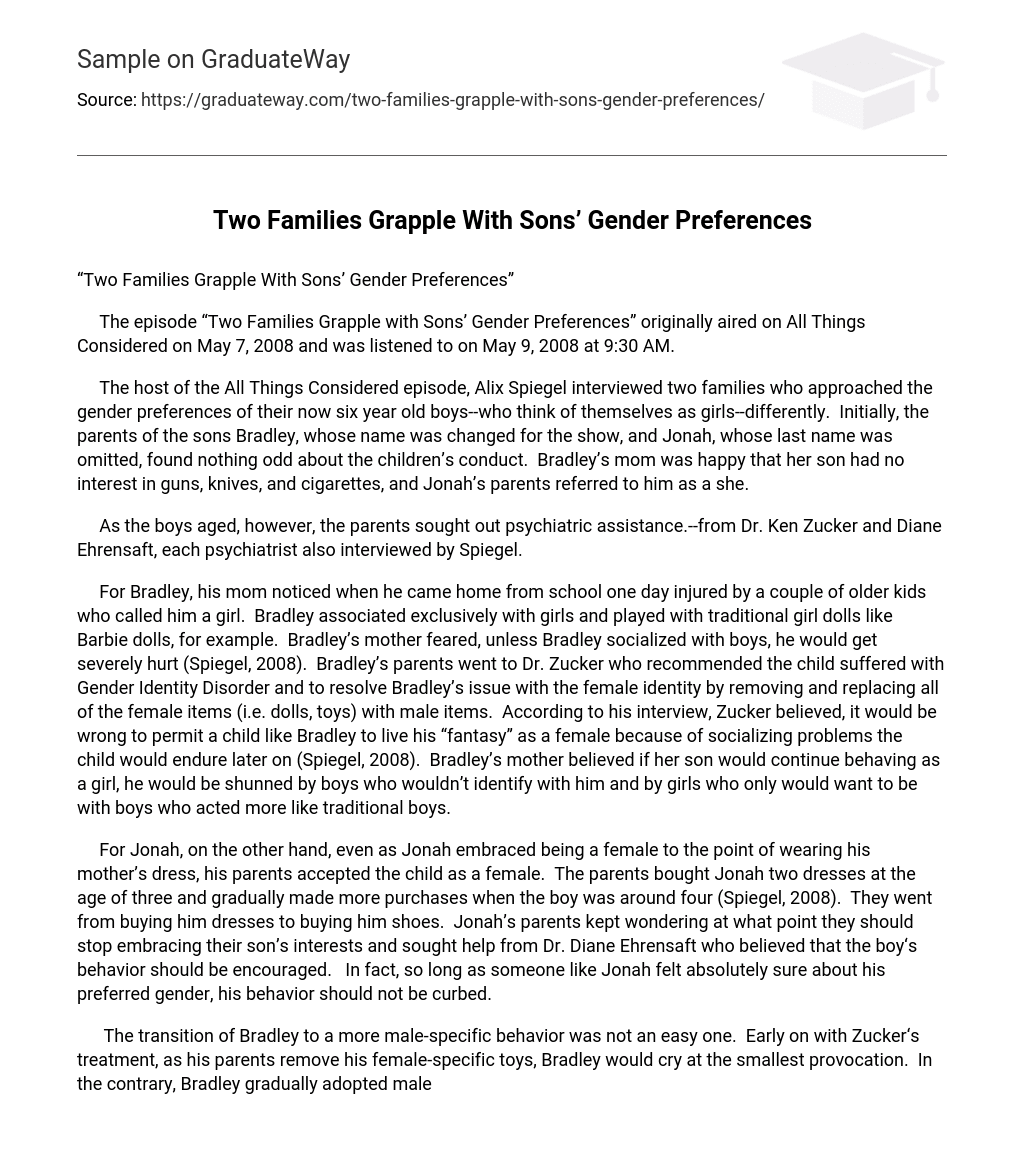The episode “Two Families Grapple with Sons’ Gender Preferences” originally aired on All Things Considered on May 7, 2008 and was listened to on May 9, 2008 at 9:30 AM.
The host of the All Things Considered episode, Alix Spiegel interviewed two families who approached the gender preferences of their now six year old boys–who think of themselves as girls–differently. Initially, the parents of the sons Bradley, whose name was changed for the show, and Jonah, whose last name was omitted, found nothing odd about the children’s conduct. Bradley’s mom was happy that her son had no interest in guns, knives, and cigarettes, and Jonah’s parents referred to him as a she.
As the boys aged, however, the parents sought out psychiatric assistance.–from Dr. Ken Zucker and Diane Ehrensaft, each psychiatrist also interviewed by Spiegel.
For Bradley, his mom noticed when he came home from school one day injured by a couple of older kids who called him a girl. Bradley associated exclusively with girls and played with traditional girl dolls like Barbie dolls, for example. Bradley’s mother feared, unless Bradley socialized with boys, he would get severely hurt (Spiegel, 2008). Bradley’s parents went to Dr. Zucker who recommended the child suffered with Gender Identity Disorder and to resolve Bradley’s issue with the female identity by removing and replacing all of the female items (i.e. dolls, toys) with male items. According to his interview, Zucker believed, it would be wrong to permit a child like Bradley to live his “fantasy” as a female because of socializing problems the child would endure later on (Spiegel, 2008). Bradley’s mother believed if her son would continue behaving as a girl, he would be shunned by boys who wouldn’t identify with him and by girls who only would want to be with boys who acted more like traditional boys.
For Jonah, on the other hand, even as Jonah embraced being a female to the point of wearing his mother’s dress, his parents accepted the child as a female. The parents bought Jonah two dresses at the age of three and gradually made more purchases when the boy was around four (Spiegel, 2008). They went from buying him dresses to buying him shoes. Jonah’s parents kept wondering at what point they should stop embracing their son’s interests and sought help from Dr. Diane Ehrensaft who believed that the boy‘s behavior should be encouraged. In fact, so long as someone like Jonah felt absolutely sure about his preferred gender, his behavior should not be curbed.
The transition of Bradley to a more male-specific behavior was not an easy one. Early on with Zucker‘s treatment, as his parents remove his female-specific toys, Bradley would cry at the smallest provocation. In the contrary, Bradley gradually adopted male friends in kindergarten and played with boy toys, at least in front of his parents. His mother believed, his son lived a double live to placate them. She believed, Bradley still played with girls at school and changed mode as soon as he got home.
Jonah seemingly appeared happy in the present. Attending a school with liberated attitudes about transgender children, Jonah put people at ease with him. He was popular with his classmates. From Ehrensaft’s experience, children like Jonah would live positive lives.
The show concluded with the claim of the psychiatric community current embrace the Zucker treatment of transgender issue instead of Ehrensaft although this would change.
REFERENCE LIST
Spiegel, A. (2008, May 7). Two families Grapple with Sons’ Gender Preferences. All
Things Considered. Retrieved May 9, 2008, from
http://www.npr.org/templates/player/mediaPlayer.html?action=1&t=1&islist=
false&id=90247842&m=90259905.





